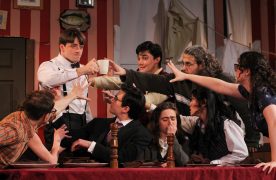Open the Journals. I dare you. Does your heart sink when you turn to the first page, each one slavishly reproduced in the author’s own handwriting? ‘Don’t read my diary when I’m gone,’ he wrote.
You know he wouldn’t have wanted this. After all, isn’t he the reluctant generational spokesman who clearly disdained the media’s fixation on his personal life? Didn’t he feel that his millions of fans, despite their good intentions, each wanted to strip away a little piece of his skin? Didn’t his deep-rooted hatred for his inescapable celebrity play a role in his suicide?
Out of morbid curiosity, you continue: ‘Please read my diary. Look through my things, and figure me out.’ The first two lines from his notebooks – frustrating, amusing and ultimately puzzlingare an appropriate opener for the innermost thoughts of the walking, talking contradiction known as Kurt Cobain.
Journals covers nearly seven years of the musician’s life, from about 1988 when he lived in the college town of Olympia, WA, until his death in 1994. The pages are littered with fascinating psychic scraps: unsent letters to peers in the punk community as well as vengeful ones to those who snubbed him before his fame; doodles of potential album artwork and storyboards for videos; fiery tirades about the evils of television and mass media; endless lists of favorite bands and songsthe Knack, Devo and the B-52’s make several eyebrow-raising cameos beside punk rock staples like the Sex Pistols and Black Flag; revisions of song lyrics; and even practice tests penned by Cobain for his driver’s examination.
Journals confirms what many die-hard Nirvana fans have assumed for quite some timethat Kurt was an unbearable paradox. The lyrics might have seemed like throwaways (A mosquito? My libido? Come again?), but always contained the necessary clues: I love myself better than you. I’m worse at what I do best. I wish I could eat your cancer when you turn black. I’m so happy, I’m so ugly, I’m so lonely, I’m so scared, I’m so horny. I’m so tired I can’t sleep. I miss the comfort in being sad.
Predictably, the collection also proves that Cobain was indeed the real thing. As you burn through entry after entry, consumed by his incendiary genius, you can’t help but draw comparisons between his terse, darkly humorous lyrics and many lines that prove hysterically quotable. As Kurt imagines a day when a geriatric Nirvana is as memorable as Kashagoogoo and remains on a tour sponsored by Depends diapers, he declares, ‘I hope I die before I become PeteTownshend.’ Other passages demonstrate Cobain’s bittersweet brand of self-effacing humor mixed with heart-wrenching empathy: ‘I would love to be those kids on the back of Kiss Alive, the ones holding the banner. Kiss. I don’t even like Kiss.’ And others are touchingly tender, like his beaming description of the life-altering moment when Kurt saw the Melvins play a live show in a parking lot.
Journals lets the public play revisionist historian. The entries disprove the long-held opinion that Cobain never wanted or worked towards the celebrity that overwhelmed his psyche. The reader also gets to witness Kurt’s shifting personalities. He morphs from Kurt Donald Cobain, the lonely teenage outsider still battling the scars of his parents’ shattering divorce, into Kurdt Kobain, a fiercely ambitious punk rock wunderkind (often rambling on for pages about how ‘Punk rock is freedom’) who still suffered from deep-rooted insecurity and self-loathing.
Cobain’s transformations occur on the page, literally. His handwriting, which once enthusiastically spilled off the margins in a rush of ideas for his band, flat lines into a neat flow of rageagainst the media, against family members and former friends, against a world that doesn’t understand himthat swells to the point of bursting.
While the Nevermind juggernaut reached unbelievable proportions, Kurt’s moodiness grew into a living, fire-breathing creature. The drug references become more frequent, and don’t think for a second that Cobain accidentally misspells ‘heroine’ throughout the second half of the journals. The entries that describe Kurt’s dance with his deadly mistress prove most disturbing for any fan who desperately wanted to believe ‘heroine’ hadn’t taken control of his life.
And for once, let’s keep the Courtney bashing to a minimum. Though the Widow Cobain has undoubtedly raked in a handsome publishing-rights fee, it’s hard to believe that Kurt did not expect these journals to someday be read. What else accounts for the constant edits and reedits, carefully surrounded by corrective scribbling, and the palpably self-conscious aura surrounding the entries? Make no mistake, though: regardless of whether Kurt would have wanted it or not, you can’t help but feel invasive as you scrutinize the famously ‘sensitive Pieces man.’ The saddest teenager in the world may have kept his diary locked in a drawer, but he made sure that the key was always within eyesight.
This is an account occasionally used by the Daily Free Press editors to post archived posts from previous iterations of the site or otherwise for special circumstance publications. See authorship info on the byline at the top of the page.













